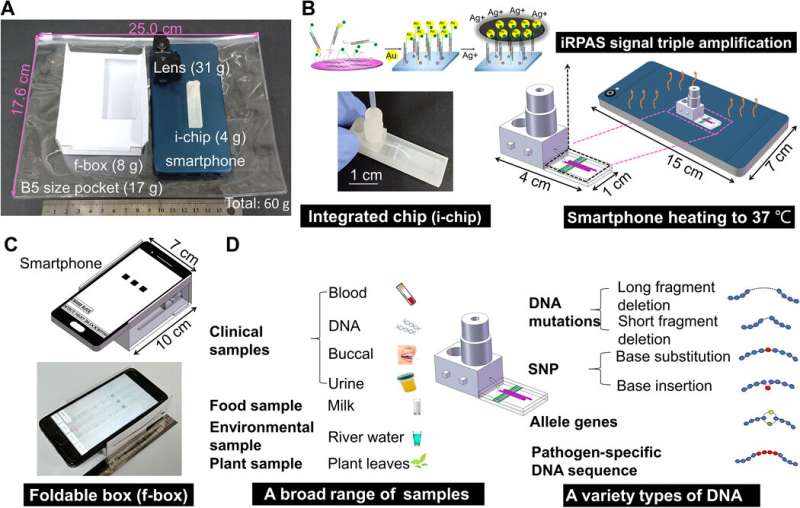April 23, 2020 report
POCKET DNA-testing kit uses smartphone to detect mutations

A team of researchers affiliated with several institutions in China and one in the U.S. has developed the POCKET DNA-testing kit—a small, inexpensive system that uses a 3-D-printed integrated chip and a smartphone to perform DNA tests on small samples of various materials. In their paper published in the journal Science Advances, the group describes the system and its possible uses.
The new system, which the team calls a point-of-care for the entire test (POCKET) device, was designed to provide small-scale DNA testing in non-laboratory settings. The system consists of a 3-D-printed integrated chip (i-chip) device and a smartphone. It weighs less than three ounces and the researchers claim it costs less than $10 to make. They suggest it could be useful in a wide variety of applications.
The system works by noting changes in DNA that can signal disease in materials such as urine, saliva or blood. The smartphone is used to heat the sample—an app raises the temperature of the processor to the degree needed. Reagents are then used to trigger reactions in sample materials and the i-chip generates visual signals—mutations can then be spotted using the smartphone's camera and a cloud-based app—with the results presented on its screen. Testing of the device showed it capable of detecting alpha- and beta-thalassemia in blood samples. It was also able to identify people with a certain gene that made them more susceptible to alcoholism using just an inner cheek swab. And it identified E. coli in milk, river water and urine—and a bacterium that attacks kiwi fruit found in ground up plant leaves. Overall, it proved to be 97 percent accurate.
The researchers claim their POCKET DNA-testing kit could potentially be modified to detect nucleic acids such as RNA in order to test people for viral infections, and that such data could be used to help track pandemics. They also claim it could be used in a wide variety of other applications such as environmental protection, clinical care, food safety and agriculture. They note that its portability and small size (the i-chip device is just 10 inches long) make it easy for users to take it wherever they need to go.
More information: Huan Xu et al. An ultraportable and versatile point-of-care DNA testing platform, Science Advances (2020). DOI: 10.1126/sciadv.aaz7445
Journal information: Science Advances
© 2020 Science X Network


















